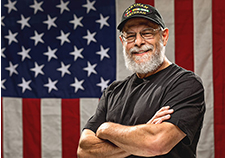Office of Research & Development |
 |


VA is increasingly offering virtual options for Veterans taking part in clinical trials. (Photo for illustrative purposes only. Credit: vorDa)
October 14, 2021
By Mitch Mirkin
VA Research Communications
"VA has been a national leader in multisite clinical trials for decades, and increasingly we have been taking advantage of newer methods to reach Veterans where they are."
Traditionally, volunteering for a clinical trial has meant traveling to a clinic for treatment or monitoring. But that is no longer always the case. The digital age has brought with it more options for patients, and VA is taking full advantage.
On Sept. 29, VA became a member of the Decentralized Trials and Research Alliance (DTRA), a nonprofit aimed at increasing access to clinical trials through telemedicine, home delivery of study medications, and other methods.
According to DTRA, its members meet regularly to engage in “advancing policies, research practices, and technologies that will accelerate the global adoption of patient-focused, inclusive, decentralized clinical trials and research.”
Well-designed and rigorous clinical trials are the gold standard for providing evidence of a medical treatment’s safety and effectiveness. They are the basis for FDA approval of new drugs and medical devices.

VA ear surgeon studies management of severe hearing loss in Veterans

Veteran disability payments led to fewer hospitalizations

Air Force Veteran among 10 new awardees in VA diversity, equity, and inclusion research program

VA researcher leads project to evaluate Veteran screening for malnutrition
A top goal of VA’s Office of Research and Development (ORD) is increasing Veterans’ access to high-quality clinical trials. Through membership in DTRA, VA will share best practices, learn new methods from other organizations, and form new partnerships.
“VA has been a national leader in multisite clinical trials for decades, and increasingly we have been taking advantage of newer methods to reach Veterans where they are. We are bringing our trials to them,” notes ORD’s Dr. Grant Huang. “Our involvement with DTRA will help us further develop these approaches, to benefit Veterans and others.”
Huang directs VA’s Cooperative Studies Program (CSP), which sponsors and oversees large clinical trials spanning multiple VA medical centers. He is also VA’s deputy chief R&D officer for enterprise optimization.
DTRA, launched in December 2020, already boasts more than 100 member organizations, mostly pharmaceutical and biotechnology companies but also academic groups and now two government agencies: VA and the Food and Drug Administration (FDA). All have an interest in advancing the idea of the virtual, or decentralized, clinical trial, whereby patients don’t need to be in person at a hospital or clinical to participate.
Traditionally in VA, Veterans would need to show up for regular visits at a medical center—often weekly—to take part in a trial, whether to receive treatment or pick up study drugs. This could be a barrier for those living in rural areas or those with transportation, mobility, or serious health challenges.
CSP has increasingly turned to technology to make it easier for Veterans anywhere in the United States to take part in trials. In some cases—especially for cancer patients—these trials may potentially offer lifesaving therapies.
In recent years, some CSP trials have used videoconferencing to allow providers to monitor patients. Others use secure phone texting to maintain contact with Veterans.
Also, in 2019, the CSP Clinical Research Pharmacy Coordinating Center in New Mexico began home delivery of study medications for some CSP trials. “This makes Veteran participation in clinical trials less burdensome,” notes Dr. Todd Conner, director of the pharmacy. So far, some 1,500 Veterans have benefited from the approach.
At least one CSP trial, testing fecal transplant therapy for C. difficile infections—a potentially severe gut illness that could result in death—involves home visits by study personnel, backed by video and phone contact.
The COVID-19 pandemic has underscored the value of virtual trials. Many trials in VA and other health systems were halted because of the restrictions on in-person visits. Some have resumed, and others are still on hold.
Besides increasing Veterans’ access to trials, giving them more options, and boosting the diversity of the Veteran population taking part in research, virtual trials can also be more cost-effective. Remote technologies and efficient shipping methods can lessen the need for study teams and infrastructure at multiple VA sites to handle in-person visits.
What about privacy and confidentiality? Are virtual trials any less secure?
Dr. Molly Klote directs the Office of Research Protections, Policy and Education within ORD. She says the same tight protections apply to virtual trials as to conventional in-person trials.
“We maintain the high standards of protection no matter how the trial is conducted,” says Klote, an internist and immunologist who retired from the Army as a colonel after 30 years of service. “We are adapting processes to meet these new situations, such as virtual consenting over approved telehealth platforms and gathering signatures electronically.”
She says any technology used to connect Veterans with researchers meets tough security standards.
“Any outside application that is used on a VA network for research purposes must undergo a rigorous security review to ensure that every participant’s information will be protected and that the VA network is protected,” explains Klote.
She notes that VA has some of its own technology in this area, such as the Annie App. The texting app is mainly intended to help Veterans with their own self-care: Users get automated reminders, and they can use the app to track their own metrics, such as blood pressure or blood sugar. The app is also now being used in some research studies.
Whatever technology is called into service, the virtual format generally means fewer trips to the clinic for Veterans. That can be an incentive not only to join a trial in the first place, but also to stick with it.
“We see the rise in decentralized trials as advantageous to the study participant,” says Klote. “When fewer trips to a central location are needed, this makes it easier for volunteers to stay in studies until the end.”
That benefits everyone: Studies that do a better job of retaining participants generate more robust data, which in turn can be more useful to investigators as they work to improve health care.
VA Research Currents archives || Sign up for VA Research updates